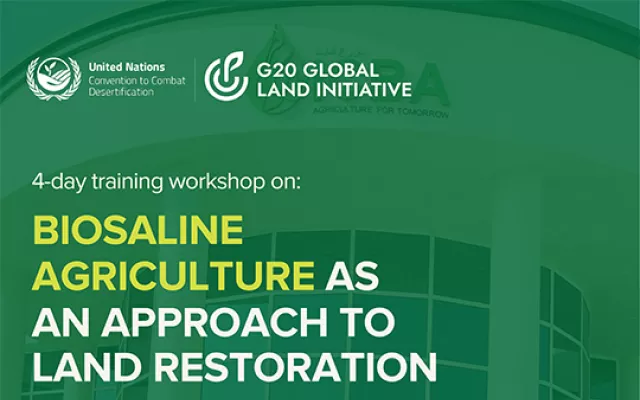Methods to help get better data to decision makers on climate change modeling
2 April 2014
On 31st of March 2014, ICBA hosted, at its Dubai headquarters, a training workshop on climate change analysis and downscaling. Led by Prof. Ben Zaitchik from Johns Hopkins University, the three-day training attracted participants from Lebanon, Jordan and Tunisia. ICBA gratefully acknowledges the support of the United States Agency for International Development, the National Aeronautics and Space Administration, and the Global Environment Facility/World Bank for the workshop.
As background to the training provided, Mr. Karim Bergaoui, Climate and Water Modeling Scientist at ICBA, explained that decision makers and researchers working on agricultural and water use efficiency applications find it hard to work on raw climate scenarios which are based on a grid of 150-200Km. Using the downscaling methods introduced in the workshop, higher resolution and smaller grid data can be generated, providing more accurate data for modeling and analysis.
“One way, to differentiate between the irrigated and rain fed land cover and land use and to optimize the information on smaller scale, is by using statistical downscaling. We take observations for precipitation and temperature and use it to downscale the data from 200km and adapt it to a smaller region of 15 km,” said Mr. Bergaoui. “The other way is dynamic downscaling where we use regional atmospheric models and couple it with general circulation models and process it on a 15km grid. In terms of results, dynamic downscaling provides gridded data on the entire domain while statistical downscaling can be extrapolated on the entire domain by using other statistical methods. In terms of requirements, the latter requires observations that are often not available or not accessible; while dynamic downscaling requires high-performing/super computers and knowledge in regional atmospheric models.”
Mr. Rashyd Zaaboul, Climate Modeling Scientist at ICBA, said that ICBA’s MAWRED team is working with NASA in the implementation of the tools, techniques, and data for the region. “We have been working with NASA on the MAWRED project for more than three years now and have assimilated quite a significant amount of knowledge and experience on climate change downscaling within the region”. ICBA has an excellent reputation in the region for delivering high level training with suitable resources and excellent facilities.










